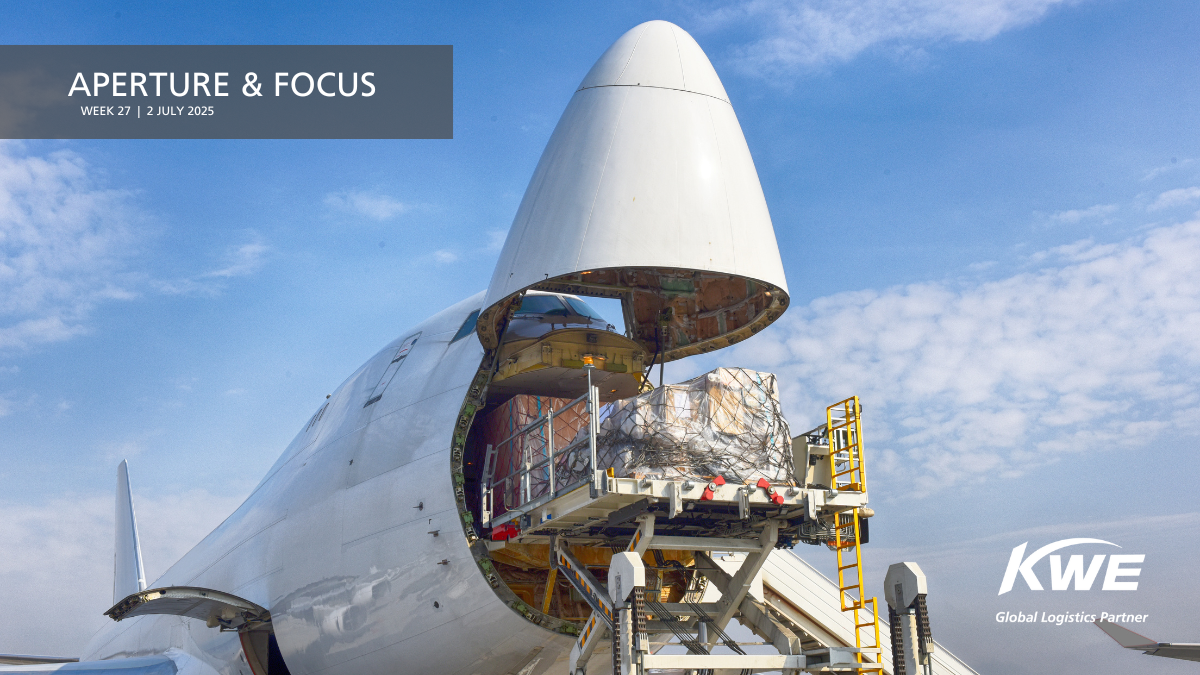Quote
Aperture & Focus 2025: Week 27

Global Aperture
In mid-July 2025, the expiration of the U.S. tariff moratorium for over 60 countries—including the EU, Canada, and Mexico—is expected to trigger a resurgence of elevated trade duties, disrupting global supply chains. Importers and exporters may face increased costs, renewed customs delays, and shipping bottlenecks as businesses rush to move goods before tariffs resume. By mid-August 2025, the separate U.S.-China tariff pause will also end, likely reintroducing steep tariffs (up to 30%) on a wide range of Chinese imports. This could lead to a significant drop in trans-Pacific cargo volumes, rerouting of supply chains, and higher consumer prices—compounding volatility in both air and ocean freight markets.
Air cargo global demand grew 2.2% year-on-year in May despite U.S. tariff changes and the repeal of the U.S. de minimis exemption on low-value shipments (≤$800) from China. While Asia–North America volumes dropped 10.7%, other trade lanes, such as Asia–Europe and Middle East–Asia, saw double-digit growth.
Ongoing conflict in the Middle East is disrupting global air and sea freight operations, as carriers reroute vessels and flights to avoid high-risk zones. While Dubai International Airport (DXB) and Jebel Ali Port remain operational, delays and longer transit times are expected on Asia–Europe and Asia–North America routes.
A new maritime port reliability ranking shows that major global hubs tend to have lower schedule reliability than smaller ports. The analysis, which emphasized recent performance and accounted for port call volume, found that smaller ports in Latin America and parts of Europe ranked highest. In contrast, high-traffic ports like Shanghai, Singapore, and Los Angeles placed much lower on the list.
Regional Focus
Americas
United States: The Port of New York and New Jersey was the nation’s busiest cargo gateway in May 2025, handling nearly 775,000 TEUs, a 20% increase over May 2019 levels. The region’s airports also saw strong travel activity, with John F. Kennedy International Airport (JFK) setting a record for May traffic.
U.S. rail traffic remained largely flat for the week ending June 21st as seasonal slowdowns and reduced intermodal activity affected volumes. Intermodal traffic softened, likely due to lower demand on the trans-Pacific route.
Canada: US President Trump halted trade talks with Canada over its Digital Services Tax on June 27th, but Canada has since announced on June 29th it will rescind the tax to advance negotiations. Both countries have now agreed to resume talks, aiming for a deal by July 21st.
Mexico: Hurricane Flossie intensified into a Category 2 storm off Mexico’s Pacific coast on July 1st. The system is forecast to strengthen further as it moves northwest, away from the coastline. Authorities have advised ports such as Manzanillo to suspend operations under the current storm watch.
Asia-Pacific
Asia Pacific air cargo demand rose 3% year-on-year in May, supported by front-loading and shifting trade routes away from China. However, the pace of growth has moderated as key manufacturing countries report reduced export activity. Airlines slightly increased available cargo capacity, with load factors averaging 62.8%.
Thailand: On June 24th, Thailand closed most border crossings with Cambodia amid a rising border dispute and growing concerns about transnational cybercrime. The closures come after a deadly clash in May and reflect escalating tensions, with both countries now imposing retaliatory trade and border restrictions.
Europe, Middle East & Africa
Belgium: Nearly 50 vessels were delayed at the Port of Antwerp on June 25th after maritime pilots at Vlissingen joined a nationwide strike. Port officials warned that it could take up to two days to clear the backlog, marking the fourth disruption caused by strike action in recent weeks.
Saudi Arabia: The Saudi Ports Authority signed long-term concession contracts to develop eight multipurpose cargo terminals. The agreements aim to modernize key ports across the Eastern and Western Provinces and improve cargo handling efficiency.